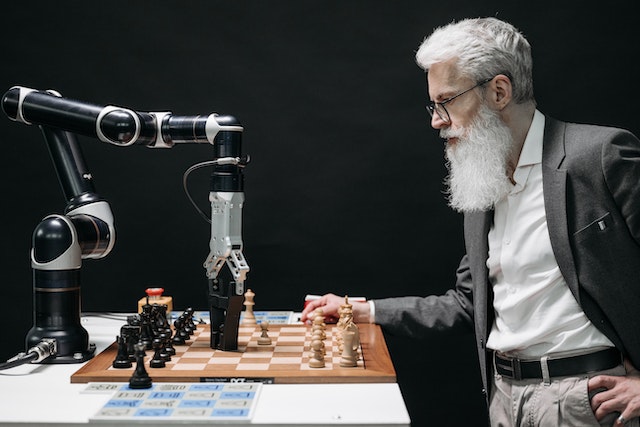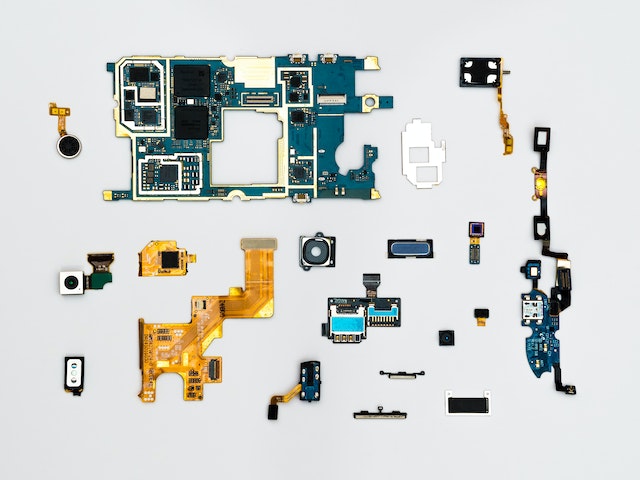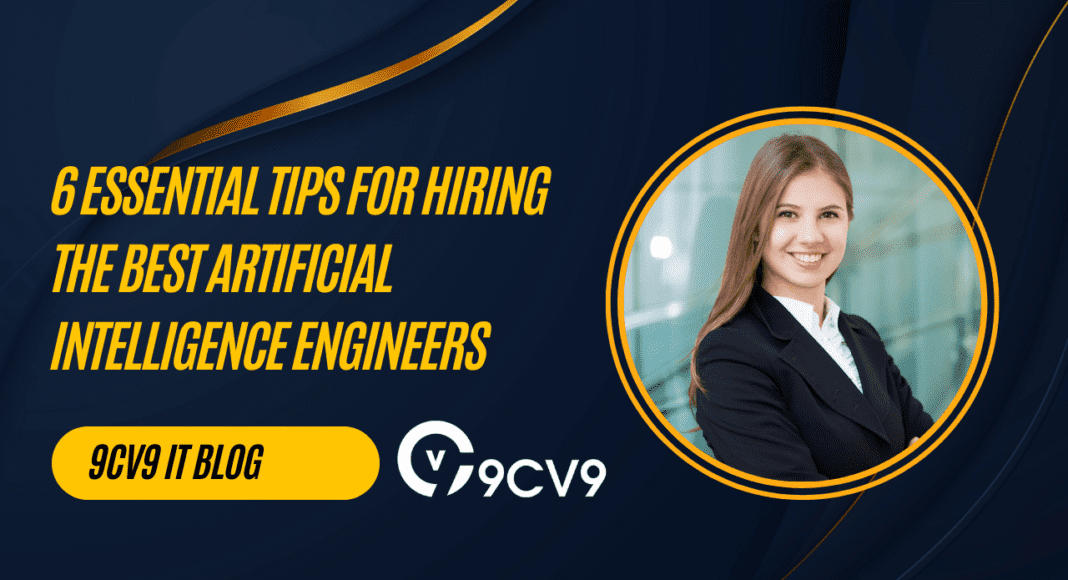Key Takeaways
- Prioritize Holistic Skills: Look beyond technical expertise and prioritize critical thinking, creativity, and collaborative abilities in AI engineers to foster innovation and drive successful AI projects.
- Showcase AI Initiatives: Demonstrating past AI projects and success stories can attract top talent, elevate your employer brand, and position your organization as a leader in AI innovation.
- Embrace Continuous Learning: Cultivate a culture of curiosity and learning to keep your AI team at the forefront of advancements, empowering them to tackle complex challenges and achieve transformative outcomes.
In the age of digital transformation, the realm of Artificial Intelligence (AI) has emerged as a powerful force reshaping industries, driving innovation, and propelling businesses toward unprecedented growth.
As organizations race to harness the potential of AI technologies, the demand for skilled AI engineers has skyrocketed, creating a fiercely competitive landscape in the talent market.
Amidst this escalating demand, one critical challenge looms large for businesses: how to identify and hire the best artificial intelligence engineers who possess the expertise, vision, and passion to spearhead groundbreaking projects that can transform businesses and impact the world.
Welcome to our comprehensive guide on “6 Essential Tips for Hiring the Best Artificial Intelligence Engineers.”
Whether you’re a visionary startup seeking to disrupt your industry or an established enterprise determined to stay ahead of the curve, the success of your AI endeavors hinges on assembling a team of exceptional AI talent.
We understand that finding and securing top-notch AI engineers can be an intricate and daunting process, but fear not.
Our carefully crafted tips will serve as your compass on this exhilarating journey toward shaping the future of innovation.
- Unraveling the Impact of AI Engineering: Before diving into the tips, let’s take a moment to explore the profound impact AI engineering can have on your organization. From automating mundane tasks to revolutionizing customer experiences, AI offers limitless possibilities. It is crucial to envision the role AI will play in your business and understand how hiring the right engineers can unlock previously untapped potential.
- Navigating the Evolving AI Landscape: The AI landscape is continually evolving, with groundbreaking advancements occurring at a breakneck pace. Understanding the different branches of AI, such as machine learning, natural language processing, and computer vision, will empower you to seek engineers with specialized skills tailored to your specific projects.
- Identifying Crucial AI Project Requirements: Clear articulation of your AI project requirements forms the bedrock of successful hiring. Pinpointing the exact skills, experience, and domain knowledge your project demands ensures you attract candidates who align seamlessly with your objectives.
- Beyond Code: The Holistic AI Engineer: While technical prowess is essential, AI engineering goes beyond lines of code. We’ll delve into the importance of assessing a candidate’s ability to think critically, creatively problem-solve, and work collaboratively within interdisciplinary teams.
- The X-Factor: Curiosity and Learning Aptitude: In the rapidly evolving AI landscape, a thirst for knowledge and a passion for learning are invaluable traits. We’ll explore strategies to spot candidates with an insatiable appetite for exploring new frontiers and adapting to emerging technologies.
- The Art of Evaluation: Assessments and Challenges: To separate the exceptional from the merely competent, incorporating technical assessments and AI challenges into your hiring process is a must. We’ll reveal proven techniques to gauge a candidate’s abilities, while maintaining fairness and transparency.
Join us on this illuminating journey as we unveil the secrets to recruiting AI engineers who possess the prowess to turn AI potential into transformative reality.
By implementing our six essential tips, you’ll gain the confidence to make informed hiring decisions that propel your organization to the forefront of the AI revolution.
Embrace the future. Embrace innovation. Embrace the power of hiring the best artificial intelligence engineers.
Let’s dive in.
Before we venture further into this article, we like to share who we are and what we do.
About 9cv9
9cv9 is a business tech startup based in Singapore and Asia, with a strong presence all over the world.
With over six years of startup and business experience, and being highly involved in connecting with thousands of companies and startups, the 9cv9 team has listed some important learning points in this overview of the guide on the 6 Essential Tips for Hiring the Best Artificial Intelligence Engineers.
If your company needs recruitment and headhunting services to hire top-quality AI Engineering employees, you can use 9cv9 headhunting and recruitment services to hire top talents and candidates. Find out more here, or send over an email to [email protected].
Or just post 1 free job posting here at 9cv9 Hiring Portal in under 10 minutes.
6 Essential Tips for Hiring the Best Artificial Intelligence Engineers
- Clearly Define Your AI Project Requirements
- Look Beyond Technical Skills
- Prioritize Experience and Relevant Projects
- Utilize Technical Assessments and AI Challenges
- Showcase Company’s AI Initiatives and Projects
- Leverage Tech Portals and AI Communities
1. Clearly Define Your AI Project Requirements

In the quest to hire the best artificial intelligence engineers, the first and most crucial step is to clearly define your AI project requirements.
Clarity in project goals and objectives will not only attract the right candidates but also streamline the hiring process, saving both time and resources.
Let’s delve into how you can effectively define your AI project requirements and bolster your chances of recruiting top-tier AI talent.
1.1 Understanding the Scope of Your AI Project
Before setting out to hire AI engineers, it is essential to have a comprehensive understanding of the scope of your AI project.
Consider the specific problem you intend to solve, the industry you operate in, and the potential impact AI could have on your business.
For instance, if you’re in the healthcare sector, your AI project might focus on medical image analysis to enhance diagnostic accuracy and patient outcomes.
Example: A leading e-commerce giant decides to leverage AI to optimize its product recommendation system. The company recognizes the need for AI engineers proficient in natural language processing and deep learning to build a personalized recommendation engine capable of understanding customer preferences from vast data sets.
1.2 Identifying Required Technical Skills and Expertise
Next, identify the specific technical skills and expertise needed for your AI project.
AI is a vast field with diverse applications, ranging from machine learning and neural networks to computer vision and reinforcement learning.
Tailoring your requirements to the skill sets directly relevant to your project will attract engineers with the right background.
Example: An autonomous vehicle startup aiming to revolutionize transportation seeks AI engineers with experience in sensor fusion, motion planning, and real-time object detection to develop advanced self-driving algorithms that ensure safety and efficiency.
1.3 Analyzing the Complexity of Your AI Project
Consider the complexity and scale of your AI project to determine the level of expertise required from potential candidates.
Some projects may involve solving intricate problems that demand a high level of technical proficiency, while others may require building scalable AI solutions to process massive data sets.
Example: A financial institution venturing into AI-powered fraud detection needs engineers who can handle the complexities of anomaly detection and build robust algorithms capable of analyzing millions of transactions in real-time.
1.4 Leveraging Data and Past AI Projects
Leverage data from past AI projects within your organization, if available, to gain insights into the expertise and resources required for successful execution.
Historical data can reveal patterns in hiring AI talent and offer valuable lessons learned from previous endeavors.
Example: A healthcare research institute embarks on an AI project to develop a predictive model for disease outbreaks.
By analyzing past AI projects, the institute identifies the need for engineers with experience in data preprocessing and time series analysis to handle the unique challenges of epidemiological data.
1.5 Ensuring Alignment with Business Objectives
It’s essential to ensure that your AI project aligns with your overall business objectives.
AI initiatives should be in sync with your company’s vision, mission, and long-term strategies to maximize their impact on organizational success.
Example: A logistics company investing in AI to optimize supply chain management aims to reduce operational costs, minimize delivery times, and improve customer satisfaction. Therefore, the AI project’s requirements are centered around engineers with expertise in optimization algorithms and logistics analytics.
According to a survey, businesses cited defining the scope and goals of AI projects as a top challenge in AI adoption. Clearly defining AI project requirements is critical to overcoming this challenge and building a strong foundation for successful AI implementation.
By having a clear understanding of your AI project requirements and aligning them with your business objectives, you create a compelling proposition for AI engineers who share your vision.
The next step is to look beyond technical skills and assess the holistic qualities that make an AI engineer truly exceptional. Let’s explore this further in the following section.
Also, read on our top informative guide on “How to Hire the Best Generative AI Professionals for Your Team” to learn about hiring the best Generative AI engineers in town.
2. Look Beyond Technical Skills – Unveiling the Holistic AI Engineer

In the pursuit of hiring the best artificial intelligence engineers, it’s essential to look beyond mere technical skills.
While technical expertise forms a critical foundation, exceptional AI engineers possess a myriad of additional qualities that set them apart.
In this section, we’ll explore the holistic traits that make an AI engineer truly exceptional and how you can identify these qualities during the hiring process.
2.1 Critical Thinking and Problem-Solving Abilities
AI engineers must be adept at tackling complex problems and devising innovative solutions. Beyond just coding, they need to possess strong analytical skills to understand and interpret vast amounts of data. Critical thinking is the driving force behind their ability to dissect intricate challenges and create effective AI models.
Example: A leading research institution seeking to optimize energy consumption in smart grids looks for AI engineers who can devise algorithms that balance energy demands, factor in dynamic variables, and minimize wastage.
2.2 Creativity and Innovation in AI Solutions
Creativity and innovation are the cornerstones of groundbreaking AI applications. Exceptional AI engineers think outside the box and push the boundaries of what’s possible, leading to the development of pioneering AI solutions that revolutionize industries.
Example: A tech startup aiming to disrupt the agriculture sector seeks AI engineers who can invent novel computer vision algorithms to identify crop diseases and optimize pesticide use, leading to sustainable and eco-friendly farming practices.
2.3 Interdisciplinary Collaboration and Communication
AI projects often involve collaboration with cross-functional teams comprising data scientists, software developers, and domain experts. Exceptional AI engineers possess strong communication skills, enabling them to effectively articulate complex concepts and collaborate seamlessly with diverse teams.
Example: A healthcare company embarking on AI-driven personalized medicine endeavors to hire AI engineers who can collaborate closely with medical professionals to ensure AI models align with ethical and regulatory standards.
2.4 Leadership and Mentorship Qualities
While technical proficiency is crucial, outstanding AI engineers also exhibit leadership potential. They can lead AI initiatives, mentor junior engineers, and inspire the team with their vision for the future of AI.
Example: A progressive AI research lab looks for AI engineers with proven leadership experience to head transformative AI projects that have a positive social impact, such as addressing climate change challenges.
2.5 Adaptability to Emerging Technologies
AI is a rapidly evolving field, with new technologies, frameworks, and tools emerging constantly. Exceptional AI engineers exhibit a natural curiosity and eagerness to stay updated with the latest trends, ensuring they can adapt and incorporate cutting-edge techniques into their work.
Example: An AI-driven virtual assistant startup seeks AI engineers who are familiar with state-of-the-art language models and have experience working with emerging technologies like transformer architectures.
According to a study by the World Economic Forum, the top three skills sought by employers in the AI job market are problem-solving, critical thinking, and creativity.
These soft skills complement technical expertise and play a crucial role in shaping the success of AI projects.
A survey indicates that 92% of talent professionals believe that soft skills are just as important.
These findings emphasize the significance of holistic qualities in AI engineers beyond their technical know-how.
By looking beyond technical skills and considering the holistic traits of AI engineers, you open doors to a pool of talent capable of driving AI innovation and making a lasting impact on your organization.
If you like to know what are the top ChatGPT AI skills to look out for, then read this article “Top 5 Generative ChatGPT AI Skills You Need to Know”
The next step in your hiring journey involves prioritizing experience and relevant projects, ensuring your selected candidates align seamlessly with your AI project’s objectives.
Let’s explore this essential aspect in the next section.
3. Prioritize Experience and Relevant Projects – Building on a Foundation of Success

In the quest to hire the best artificial intelligence engineers, experience and relevant projects take center stage.
A track record of successfully executed AI projects not only demonstrates technical competence but also showcases an engineer’s ability to deliver tangible results.
In this section, we’ll delve into the significance of prioritizing experience and relevant projects during the hiring process and how it can elevate the caliber of your AI team.
3.1 The Value of Practical AI Project Experience
Practical experience is a crucial indicator of an AI engineer’s capabilities. Candidates with hands-on experience in real-world AI projects bring invaluable insights, having navigated challenges and implemented solutions in dynamic environments.
Their understanding of the practical aspects of AI deployment can contribute significantly to the success of your AI initiatives.
Example: A financial institution seeking to develop AI-powered fraud detection looks for AI engineers who have previously implemented fraud detection systems in the banking or finance sector. This prior experience demonstrates their ability to adapt AI algorithms to address unique challenges in the industry.
3.2 Assessing Involvement in Relevant AI Applications
An engineer’s involvement in relevant AI applications can provide a deeper understanding of their expertise in specific domains.
Candidates who have contributed to AI projects aligned with your industry can offer unique perspectives and domain knowledge that add value to your organization.
Example: An e-commerce company seeking to enhance its customer experience through AI-driven chatbots prioritizes candidates who have worked on conversational AI applications. Their experience in developing chatbots that comprehend natural language and offer personalized recommendations aligns well with the company’s goals.
3.3 Leveraging AI Project Portfolios and Case Studies
To gauge an engineer’s proficiency, request a portfolio or case studies detailing their past AI projects.
This documentation provides insights into their problem-solving approach, model selection, and the impact of their solutions.
Analyzing case studies can help you assess the relevance and scale of their previous projects.
Example: A healthcare organization reviews an AI engineer’s case study, showcasing how they developed a deep learning model for medical image analysis. The case study highlights the model’s accuracy in diagnosing rare diseases, which aligns with the healthcare company’s focus on improving diagnostics.
3.4 Recognizing Industry-Specific Expertise
Industry-specific knowledge is invaluable, especially when tackling AI projects with domain-specific challenges. Engineers with prior experience in your industry possess insights into its nuances, compliance requirements, and potential AI applications that can directly benefit your business.
Example: An energy company looking to optimize its power grid leverages engineers with a background in the energy sector. Their understanding of energy consumption patterns and grid optimization algorithms enables them to design AI solutions tailored to the industry’s unique needs.
According to a report, artificial intelligence specialists ranked among the top emerging jobs globally, with AI specialist roles experiencing a significant growth rate year over year.
Prioritizing experience and relevant projects in your hiring process is like building on a foundation of success. AI engineers who have demonstrated their prowess through real-world projects bring a wealth of knowledge and practical skills to your organization.
By leveraging their experience, you can accelerate the implementation of AI initiatives, reduce potential risks, and foster a culture of innovation.
4. Utilize Technical Assessments and AI Challenges – Unleashing the Potential of AI Talent

When seeking to hire the best artificial intelligence engineers, technical assessments and AI challenges are indispensable tools in your arsenal.
These evaluations go beyond traditional interviews, enabling you to gauge candidates’ hands-on skills, problem-solving capabilities, and creativity in tackling real-world AI scenarios.
In this section, we’ll explore the significance of utilizing technical assessments and AI challenges in the hiring process and how they can unlock the full potential of your AI talent.
4.1 The Art of Evaluating AI Engineering Skills
Technical assessments serve as a litmus test for an AI engineer’s expertise.
By conducting hands-on evaluations, you can ascertain a candidate’s proficiency in coding, algorithm design, data preprocessing, and model evaluation. These assessments provide valuable insights into how candidates approach AI problems and craft solutions.
Example: A tech company focusing on AI-powered recommendation systems administers a technical assessment to evaluate candidates’ ability to build collaborative filtering algorithms and design personalized recommendation engines based on user behavior.
4.2 Problem-Solving through AI Challenges
AI challenges are real-world simulations that present engineers with complex AI problems to solve. These challenges offer a glimpse into candidates’ creativity, resourcefulness, and adaptability.
Successful completion of AI challenges demonstrates a candidate’s ability to apply AI techniques to practical scenarios.
Example: A robotics startup organizing an AI challenge tasks candidates with developing a reinforcement learning algorithm that enables a robot to navigate through a maze while avoiding obstacles. The challenge assesses candidates’ AI capabilities in a dynamic environment.
4.3 Ensuring Fair and Transparent Assessments
While conducting technical assessments and AI challenges, it’s crucial to ensure fairness and transparency.
Create evaluation criteria that align with your AI project requirements and communicate them clearly to candidates.
Transparent assessments enhance candidate experience and uphold the integrity of your hiring process.
Example: A research institute conducting technical assessments for AI engineers defines evaluation criteria based on coding proficiency, model performance, and a candidate’s ability to explain their approach in a structured manner.
4.4 Showcasing AI Challenge Results
Publicly showcasing AI challenge results can attract top talent to your organization. Engineers are drawn to companies that offer opportunities to participate in intellectually stimulating challenges and foster an environment of healthy competition.
Example: An AI-driven gaming company publishes the results of an AI challenge they hosted, showcasing the innovative solutions developed by participants. This publicity generates interest from AI enthusiasts seeking to join a cutting-edge gaming tech team.
Utilizing technical assessments and AI challenges in your hiring process empowers you to identify AI engineers who possess the skills, creativity, and problem-solving capabilities essential for your AI initiatives.
By crafting fair and transparent evaluations, you ensure a robust assessment of candidates’ AI expertise.
Publicly showcasing AI challenge results enhances your organization’s reputation as a hub for innovation, attracting top AI talent eager to contribute their skills to your cutting-edge projects.
Also, if you like to know what are some nice ideas that Generative AI can help to make you earn more money, have a read at our latest article “8 Generative AI Startup Ideas you can use to Earn Money in 2023”.
5. Showcase Company’s AI Initiatives and Projects – Cultivating an AI-Ready Workplace

In the competitive landscape of AI talent acquisition, showcasing your company’s AI initiatives and projects is a strategic approach that can attract and retain the best artificial intelligence engineers.
Demonstrating a commitment to innovation, real-world applications, and a strong AI-driven culture can entice top talent and position your organization as a leader in the AI domain.
In this section, we’ll explore the significance of showcasing your company’s AI initiatives and projects, and how it can create an AI-ready workplace that fosters excellence and drives transformative innovation.
5.1 The Power of Employer Branding in AI Talent Acquisition
In the battle for AI talent, employer branding plays a pivotal role.
Top AI engineers seek organizations that are at the forefront of AI innovation, where their expertise is valued, and their work has a meaningful impact.
Showcasing your company’s AI initiatives through various channels, such as your website, social media, and industry events, elevates your employer brand and attracts AI talent seeking cutting-edge opportunities.
Example: A tech startup dedicated to developing AI-powered autonomous vehicles actively shares updates on its autonomous driving projects through blog posts and videos. Their employer branding efforts draw attention from skilled AI engineers passionate about revolutionizing transportation.
5.2 Sharing Success Stories of AI Implementation
Highlighting success stories of AI implementation within your organization provides tangible evidence of your AI capabilities.
These stories illustrate how your AI projects have solved real-world problems, improved processes, or enhanced customer experiences.
Prospective candidates are more likely to be drawn to organizations that have demonstrated the successful application of AI technologies.
Example: A healthcare company showcases a case study on how their AI-driven predictive analytics model significantly reduced hospital readmission rates. The successful implementation of this AI solution attracts AI engineers who want to contribute to projects with a positive societal impact.
5.3 Collaboration with AI Thought Leaders
Collaborating with AI thought leaders, influencers, and researchers can amplify your company’s presence in the AI community.
By participating in webinars, conferences, and industry events, your organization gains exposure and credibility as a hub for AI innovation.
Such collaboration fosters relationships with AI enthusiasts and experts who may be potential candidates for your AI team.
Example: A financial technology company partners with prominent AI researchers and hosts a virtual AI summit. By featuring insightful discussions on AI trends and showcasing their own AI achievements, the company enhances its reputation as a thought leader and attracts AI talent to be part of its transformative projects.
5.4 Leveraging AI Awards and Recognition
Participating in AI competitions and receiving awards or recognition for your AI projects can significantly impact your company’s appeal to AI engineers.
Accolades validate your AI prowess and provide external validation of your organization’s capabilities.
Example: A data analytics company wins an AI excellence award for its AI-driven anomaly detection system. This recognition not only establishes their expertise in AI but also serves as a powerful recruitment tool, attracting top AI talent eager to contribute to award-winning projects.
A survey by LinkedIn revealed that 75% of professionals consider an organization’s reputation and employer brand before applying for a job.
This underscores the importance of showcasing your company’s AI initiatives to attract top AI talent.
By showcasing your company’s AI initiatives and projects, you create an AI-ready workplace that resonates with top artificial intelligence engineers.
Emphasizing your commitment to innovation, sharing success stories, and collaborating with AI thought leaders elevates your employer brand and positions your organization as a sought-after destination for AI talent.
Leveraging AI awards and recognition further reinforces your AI capabilities, attracting engineers eager to contribute their skills to transformative projects.
6. Leverage Tech Portals and AI Communities – Cultivating Connections for AI Success

In the ever-expanding digital landscape, tech portals, and AI communities have emerged as veritable goldmines for talent acquisition in the realm of artificial intelligence.
These virtual hubs offer unparalleled access to a vast pool of AI experts, enthusiasts, and researchers.
By harnessing the power of these platforms, organizations can unlock boundless opportunities to connect with top AI talent and cultivate a culture of innovation.
In this section, we’ll delve into the significance of leveraging tech portals and AI communities in your talent acquisition efforts, along with practical examples and verified data to guide your approach.
6.1 The Digital Ecosystem of Tech Portals
Tech portals such a 9cv9 serve as online gateways to a treasure trove of AI professionals, making them a go-to resource for hiring managers seeking to fill AI positions.
These portals aggregate AI-specific job postings, resumes, and company profiles, streamlining the talent search process and facilitating targeted outreach to candidates with specialized AI expertise.
Example: A tech company looking for a machine learning specialist posts a job listing on 9cv9. The listing attracts AI engineers who have opted to receive job alerts for relevant positions, leading to a pool of potential candidates eager to explore opportunities in the organization.
6.2 Engaging AI Communities for Talent Acquisition
AI communities, both online and offline, form thriving ecosystems where AI enthusiasts, experts, and researchers convene to discuss cutting-edge advancements, share insights, and collaborate on projects.
Active participation in these communities allows organizations to build meaningful connections, identify potential talent, and showcase their AI initiatives.
Example: An AI research institute actively participates in an online AI community, sharing research findings and engaging in discussions with AI enthusiasts. This active engagement fosters a reputation as a thought leader in AI, attracting top AI talent interested in contributing to groundbreaking research.
8.3 The Impact of Data-Driven Talent Insights
Tech portals and AI communities often provide valuable data-driven insights into AI talent trends.
These platforms may offer reports on AI skill demand, salary benchmarks, and regional talent distribution, helping organizations make informed decisions in their talent acquisition strategies.
Example: A startup specializing in natural language processing consults a tech portal’s talent insights report to identify the most sought-after NLP skills in the job market. Armed with this data, the company tailors its job description to attract AI engineers with the desired expertise.
8.4 Building Brand Visibility and Credibility
Participating in tech portals and AI communities strengthens an organization’s employer brand, amplifying its visibility in the AI talent market.
Engaging with AI enthusiasts, sharing thought leadership content, and promoting the organization’s AI initiatives enhance brand credibility and attract AI talent looking to contribute to innovative projects.
Example: A tech giant hosts an AI-focused webinar through an AI community platform, where its AI experts present groundbreaking research. The webinar’s popularity generates interest from AI engineers eager to be part of the organization’s pioneering AI projects.
Leveraging tech portals such as 9cv9 and AI communities unveils a digital frontier for talent acquisition in the realm of artificial intelligence.
These platforms provide unparalleled access to AI experts, data-driven insights, and opportunities to showcase your organization’s AI initiatives.
Engaging with AI enthusiasts and researchers builds brand visibility, amplifies credibility, and attracts top AI talent eager to contribute their skills to transformative projects.
Embrace the digital ecosystem of tech portals and AI communities, explore the vast landscape of AI talent, and unlock the potential to build a high-caliber AI team that drives innovation and achieves remarkable AI outcomes.
Harness the power of online networks to elevate your organization’s AI endeavors, and let the journey towards AI excellence be guided by the connectivity and collaboration of the digital age.
Above all, we highly recommend looking toward Vietnam to hire top AI engineers. Read our guide “Why Vietnam is a hot destination for Hiring Generative AI ChatGPT Engineers” to learn more.
Conclusion
In the dynamic landscape of AI, hiring the best artificial intelligence engineers can be the key differentiator between an organization’s success and stagnation.
The journey to assembling a high-caliber AI team capable of driving transformative innovation and revolutionizing industries requires a strategic approach that goes beyond technical expertise.
Throughout this comprehensive guide, we have explored six essential tips to empower your AI dreams and master the art of hiring top AI talent.
With these six essential tips at your disposal, you are equipped to embark on a transformative journey to hire the best artificial intelligence engineers.
Embrace the power of clarity, creativity, experience, and continuous learning to cultivate an AI-ready workplace that fuels innovation and drives impactful solutions.
By showcasing your company’s AI initiatives and projects, you communicate your commitment to cutting-edge technology, attracting AI talent eager to be part of your organization’s success story.
In the dynamic realm of AI, the journey to hire the best AI talent is an ever-evolving one. Stay abreast of industry trends, embrace collaboration, and empower your AI team to create a culture of excellence.
The path to realizing your AI dreams begins with the people who drive the technology forward – the exceptional AI engineers who will shape the future of industries and transform the world as we know it.
Together, let us embark on this transformative adventure, fueled by innovation, powered by AI, and guided by the passion to make the impossible, possible.
If your company needs HR, hiring, or corporate services, you can use 9cv9 hiring and recruitment services. Book a consultation slot here, or send over an email to [email protected].
If you find this article useful, why not share it with your hiring manager and C-level suite friends and also leave a nice comment below?
We, at the 9cv9 Research Team, strive to bring the latest and most meaningful data, guides, and statistics to your doorstep.
To get access to top-quality guides, click over to 9cv9 Blog.
People Also Ask
How much does IT cost to hire an AI engineer?
The cost of hiring an AI engineer varies based on factors such as experience, location, and company size. On average, AI engineer salaries range from $100,000 to $150,000 per year, with additional expenses for recruitment, benefits, and training.
What is the highest-paid AI engineer?
The highest-paid AI engineers can earn annual salaries exceeding $200,000, especially in top technology hubs like Silicon Valley. However, compensation may vary based on experience, expertise, and the organization’s financial capabilities.
How do I hire an AI expert?
To hire an AI expert, follow these steps:
- Clearly define your AI project requirements.
- Utilize AI-specific job boards and platforms.
- Leverage AI communities and industry events.
- Conduct technical assessments and AI challenges.
- Showcase your company’s AI initiatives to attract top talent.































![Writing A Good CV [6 Tips To Improve Your CV] 6 Tips To Improve Your CV](https://blog.9cv9.com/wp-content/uploads/2020/06/2020-06-02-2-100x70.png)


